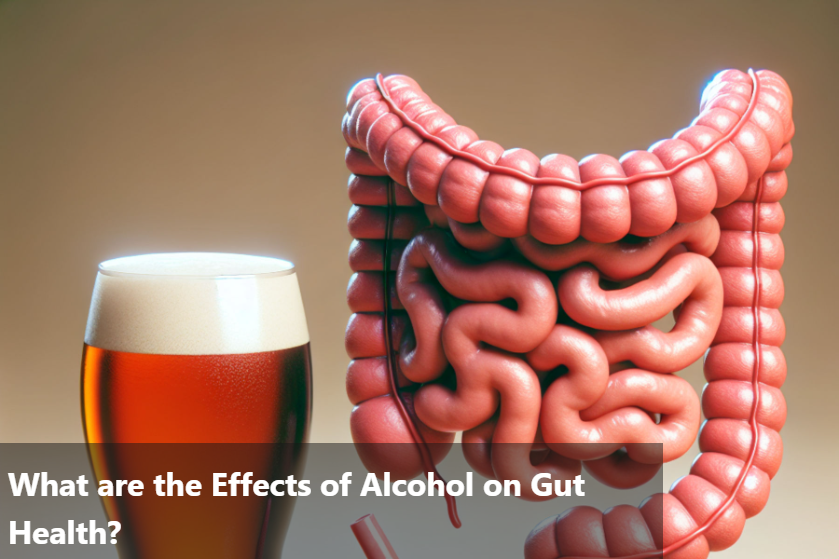
What are the Effects of Alcohol on Gut Health?
Share
The gastrointestinal (GI) tract plays a pivotal role in overall health, housing trillions of microorganisms collectively referred to as the gut microbiota. These microbes influence digestion, immune function, and even mental well-being. However, lifestyle factors, particularly alcohol consumption, can significantly impact gut health. This article explores the effects of alcohol on gut microbiota composition, intestinal permeability, immune response, and the potential for systemic diseases.

Impact of Alcohol on Gut Microbiota
Alcohol consumption disrupts the delicate balance of gut microbiota, leading to dysbiosis—an imbalance between beneficial and harmful microbes. Research suggests that chronic alcohol intake:
Reduces beneficial bacteria such as Lactobacillus and Bifidobacterium.
Increases pathogenic bacteria like Escherichia coli and Clostridium species.
Leads to overgrowth of harmful Gram-negative bacteria, which release lipopolysaccharides (LPS) that trigger systemic inflammation.
This dysbiosis is linked to gastrointestinal disorders, metabolic diseases, and mental health disturbances such as depression and anxiety.
Alcohol and Intestinal Permeability (“Leaky Gut”)
Alcohol compromises the intestinal epithelial barrier, leading to increased permeability, commonly referred to as a “leaky gut.” Ethanol damages tight junction proteins (e.g., occludin, claudins) that maintain gut integrity. As a result:
Toxins and bacteria translocate from the gut lumen into systemic circulation.
Inflammatory cytokines (TNF-α, IL-6) are upregulated, contributing to systemic inflammation.
Liver disease progression is accelerated, particularly in conditions like alcoholic liver disease (ALD) and non-alcoholic fatty liver disease (NAFLD).
Alcohol’s Influence on Digestive Function
Chronic alcohol intake affects digestion and absorption processes in several ways:
Condition |
Description |
|---|---|
Gastric Acid Secretion |
Excessive alcohol consumption increases gastric acid production, contributing to gastritis, ulcers, and gastroesophageal reflux disease (GERD). |
Pancreatic Function |
Alcohol-induced inflammation impairs pancreatic enzyme secretion, leading to malabsorption and nutrient deficiencies. |
Motility Disorders |
Alcohol can alter gut motility, causing diarrhea, constipation, or irritable bowel syndrome (IBS)-like symptoms. |
Alcohol and Immune System Dysregulation
The gut-associated lymphoid tissue (GALT) plays a crucial role in immune defense. Alcohol disrupts this immune regulation by:
Impairing mucosal immunity, reducing the production of secretory IgA (sIgA), which protects against infections.
Increasing susceptibility to infections such as Helicobacter pylori and Clostridium difficile.
Enhancing the pro-inflammatory response, exacerbating autoimmune diseases and inflammatory bowel diseases (IBD).
Systemic Implications of Alcohol-Induced Gut Dysfunction
A compromised gut can contribute to various systemic diseases:
Liver Diseases: Gut-derived endotoxins exacerbate hepatic inflammation and fibrosis, contributing to ALD and cirrhosis.
Metabolic Disorders: Dysbiosis influences insulin resistance, increasing the risk of type 2 diabetes.
Neuroinflammation: The gut-brain axis is affected, potentially worsening conditions like anxiety, depression, and neurodegenerative diseases.

Strategies to Mitigate Alcohol’s Impact on Gut Health
To minimize alcohol’s detrimental effects on gut health, the following measures are recommended:
Moderation: Limiting alcohol intake as per guidelines (e.g., no more than one drink per day for women and two for men).
Probiotics and Prebiotics: Consumption of fermented foods, yogurt, and fiber-rich diets supports microbial diversity.
Hydration and Nutrient Support: Electrolyte balance, along with vitamins such as B-complex and vitamin D, supports gut and liver function.
Anti-inflammatory Diet: Omega-3 fatty acids, polyphenols (found in berries, green tea), and turmeric reduce inflammation.
Regular Physical Activity: Exercise promotes gut microbiome diversity and metabolic health.
Weight Management: Reducing alcohol intake can help in weight loss by lowering empty calorie consumption and improving metabolic function.
Elevate Now provides science-backed, doctor-prescribed weight loss solutions, helping individuals achieve a 15-18% reduction in body weight within six months. Unlike traditional methods, it targets underlying medical factors like metabolism, deficiencies, and inflammation for lasting results.
With expert supervision, Elevate Now combines effective medications such as GLP-1, SGLT2 inhibitors, Orlistat, and Metformin with personalized coaching on nutrition, fitness, sleep, and stress management.(check eligibility)
This holistic approach ensures sustainable weight loss, making fad diets a thing of the past.(read more)
Summary
Alcohol has profound effects on gut health, disrupting microbiota balance, increasing intestinal permeability, impairing digestion, and altering immune responses. Chronic alcohol consumption contributes to systemic diseases, including liver disorders, metabolic dysfunction, and neuroinflammatory conditions. Adopting moderation, dietary strategies, and lifestyle modifications can help mitigate these adverse effects.
FAQs
1. How does alcohol cause gut inflammation?
Alcohol alters gut microbiota and increases intestinal permeability, leading to endotoxin-induced inflammation.
2. Can moderate drinking still affect gut health?
Yes, even moderate alcohol intake can impact gut microbial balance and intestinal barrier integrity.
3. What are the symptoms of alcohol-related gut issues?
Symptoms may include bloating, diarrhea, acid reflux, abdominal pain, and increased susceptibility to infections.
4. Can probiotics reverse alcohol-induced gut damage?
Probiotics can help restore microbial balance, but they work best alongside reduced alcohol consumption and a healthy diet.
5. What is the best way to support gut health after alcohol consumption?
Hydration, fiber-rich foods, probiotics, and anti-inflammatory nutrients can help repair gut integrity and restore microbial balance.
